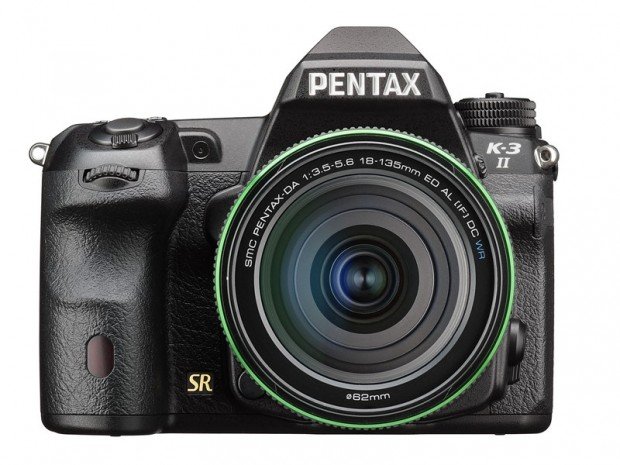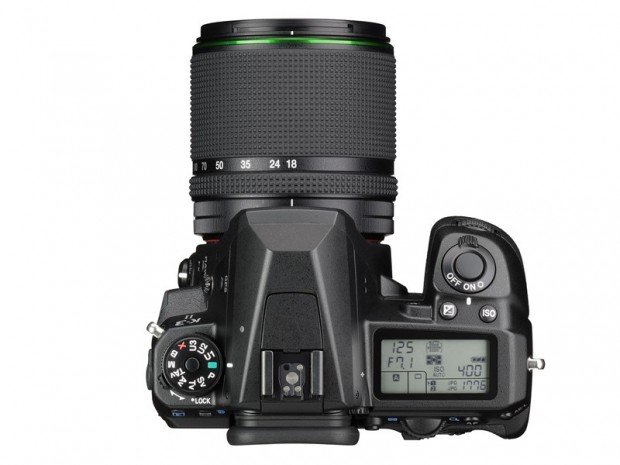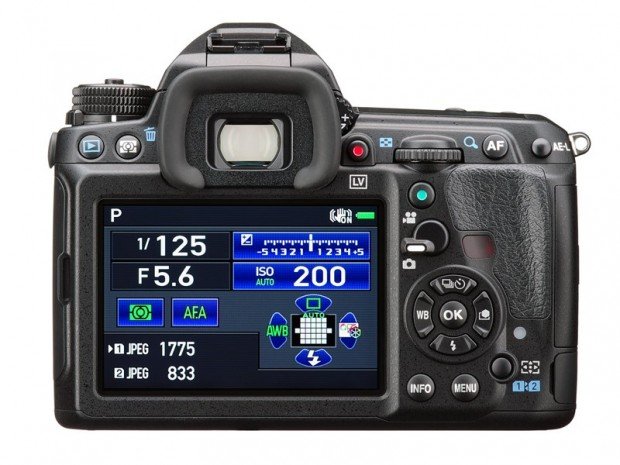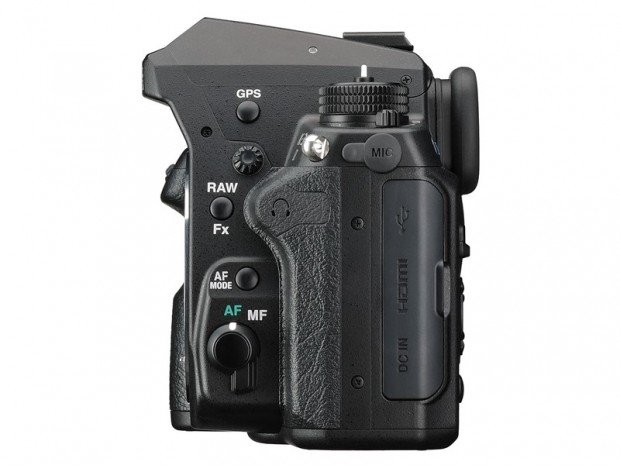
Ricoh, seperti yang diprediksi sebelumnya, baru saja meluncurkan Pentax K-3 II sebuah kamera DSLR yang diperuntukkan untuk semi-pro. Kamera ini memiliki sistem stabilisasi gambar yang ditingkatkan, dan khusus untuk peningkatan kualitas gambar, seperti yang telah disebutkan, Ricoh Pentax menambahkan fitur yang dikenal sebagai Pixel Shift Resolustion, dirancang untuk mengurangi false-color. Mempertahankan sensor pendahulunya yaitu 24Mp, sistem AF 27-point dan konstruksi bodi tahan lama. Pentax K-3 II menggunakan IS sensor-shift yang diklaim mengurangi efek goyang pada saat penggunaan dengan tangan hingga 4,5 stop.
Kamera ini juga sudah dilengkapi built-in GPS, algoritma AF yang ditingkatkan, juga fitur deteksi panning berbasis gyro-sensor dan koreksi horizon cakrawala otomatis. Hanya saja ada yang dikurangi yaitu flash built-in, sehingga pengguna harus sedia external flash jika membutuhkan tambahan cahaya.
Ricoh sebagai pemilik Pentax, tetap mempertahankan apa yang membuat kamera DSLR K-3 dikenal, yaotu segel bodi tahan cuaca dan tahan banting, kualitas gambar yang baik, viewfinder yang besar, slot kartu memori ganda dan banyak lagit termasuk banyak perbaikan-perbaikan yang sebelumnya menjadi poin lemah.
Pentax K-3 II akan tersedia pada bulan Mei dengan harga USD $1100. Berikut spesifikasi, preview, gambar dan press release-nya.
Table of Contents
Spesifikasi Kamera
- Sensor CMOS 24MP (no low pass filter)
- Image processing engine PRIME III
- Fungsi anti-moire yang lebih baik
- Shutter 4.5 stages untuk shake correction
- Shutter Speed 1/8000 – 30 sec, bulb
- Flash Sync Speed 1/180 sec
- High-resolution image dengan pixel shift
- Low noise, color reproduction dan detail terbaik
- Metering sensor RGB 86000 pixel
- ISO range 100-51200
- Video full HD 60 fps/30 fps
- Dust water sealing di 92 bagian
- Chassis stainless, bodi magnesium alloy
- Tanpa built-in flash
- GPS built-in
- Electronic compass built. Bisa menampilkan arah di LCD
- ASTROTRACER
- AF module SAFOX 11. AF point 27 points (25 points cross type)
- Continuous AF dengan perbaikan akurasi
- Continuous shooting 8.3 frames / sec. 60 buffer dalam JPEG, 23 dalam RAW
- 100% field of view, magnification 0.95X
- LCD monitor 3.2 inches, 1.037 million dot
- Dual SD card slot
- Bisa dioperasikan melalui smartphone-tablet
- USB 3.0 dan HDMI terminal
- Baterai D-LI90
- Ukuran 131.5 x 102.5 x 77.5mm
- Berat 785g
Preview, Hands On dan First Impression
- Hands on oleh dpreview.com
- Review oleh imaging-resource.com
- Preview oleh techradar.com
- First look oleh bhphotovideo.com
- Review oleh www.tomsguide.com
Gambar Kamera



Press Release
The New PENTAX K-3 II Builds on the Performance Standard Set by Its Predecessor Further Refining Field Photography
Expanding on the K-3 legacy, the newly released K-3 II adds GPS functionality, improved Shake-Reduction (SR) technology, high speed AF and built-in ASTROTRACER.
Denver, Colorado, April 22, 2015 RICOH IMAGING AMERICAS CORPORATION is proud to introduce the PENTAX K-3 II Digital SLR; refining the ultimate field camera. Developed as the successor to the award winning PENTAX K-3, the new K-3 II shares its predecessor’s magnesium alloy casing, metal chassis, 24.35 effective megapixel resolution, 27-point AF system and approximately 8.3 frames per second shooting while adding an improved 4.5EV stop shake reduction system, new high-speed AF algorithm, GPS, gyro sensor panning detection and automatic horizon correction.
“The introduction of the PENTAX K-3 II marks our commitment to providing photographers with rugged high quality solutions that exceed our customers’ expectations,” said Jim Malcolm, President of Ricoh Imaging Americas Corporation. The “magic’’ we add to our cameras through the motion-controlled Shake Reduction (SR) technology helps our photographers shoot for the stars and capture images in stunning detail; no other manufacturer is offering such a variety of features in a single camera design.”
The K-3 II is the first camera in the PENTAX line to incorporate Pixel Shift Resolution® for capturing still life subjects with ultra-high resolving power. Pixel shift technology uses the camera’s in-body Shake Reduction mechanism to move the image sensor at single pixel increments, capture 4 separate images, which are subsequently combined into a single high definition image. Benefits include higher resolving power, reduced false color and improved overall image quality of non-moving subjects.
Building on the PENTAX K-3 camera’s rugged dust proof and weather-resistant construction, the K-3 II features a built-in GPS receiver, GPS log and electronic compass purpose- designed to stand up to demanding location work. The GPS system records shooting location, camera orientation, altitude, and provides a date/time stamp tied specifically to your images; all of which can be transferred to a computer and mapped using services such as Google Earth™.
By combining the power of GPS positioning with in-body shake reduction mechanism, the PENTAX K-3 II cameras exclusive built in ASTROTRACER® features tracks and photographs astronomical bodies such as stars and planets. The system uses GPS and orientation location data together with magnetic and acceleration sensors to calculate the motion needed to synchronize the CMOS sensor with the movement of the stars; making it possible to capture stars as points of light rather than star trails during long exposures.
“The original PENTAX K-3 has been my go to camera since it was first introduced,” said professional photographer Kerrick James. “Now with the addition of GPS, Pixel Shift Resolution, and 4.5EV stop shake reduction, my field photography is further refined and documented regardless of my remote location. This ensures my demanding shooting style will always be met and will provide my clients with consistently high quality photography.”
The new PENTAX K-3 II uses the advanced and intuitive user interface common to most PENTAX camera products. The system is compatible with a host of accessories including a versatile array of flash units, lenses, battery grip and interchangeable focus screens.
Pricing and Availability
The PENTAX K-3 II will be available at retailers nationwide and at www.us.ricoh-imaging.com in May 2015 for a suggested retail price of $1099.95.
Main Features
1. High-resolution images
The K-3 II combines an APS-C-size CMOS image sensor free of an anti-aliasing filter with the high-performance PRIME III imaging engine — identical to the one installed in the PENTAX 645Z medium-format digital SLR camera — to optimize the imaging power of approximately 24.35 effective megapixels and deliver sharp, fine-gradation images. It also effectively minimizes annoying noise generated at higher sensitivities, allowing high-grade, high-sensitivity shooting even at the top sensitivity of ISO 51200.
2. New-generation PENTAX-original shake reduction mechanism
(1) Upgraded in-body SR mechanism to assure the best shake reduction performance in the K series
The K-3 II comes equipped with a PENTAX-developed SR (Shake Reduction) mechanism that can be used with any compatible PENTAX interchangeable lens.* Thanks to its new, high-precision gyro sensor, this mechanism assures more stable, effective camera-shake compensation than ever before, with an extra-wide compensation range of as much as 4.5 shutter steps — the widest of all K-series digital SLR models. Even when taking a panning shot, this efficiently controls the SR unit to always produce the best image possible under the given conditions.
(2) New Pixel Shift Resolution System to deliver image resolutions higher than the image sensor’s capacity
The K-3 II features Pixel Shift Resolution System,** the latest super-resolution technology, which captures four images of the same scene by shifting the image sensor by a single pixel for each image, then synthesizes them into a single composite image. Compared to the conventional Bayer system, in which each pixel has only a single unit of color data, this new system obtains all color data in each pixel. This innovative system delivers super-high-resolution images with far more truthful color reproduction and much finer details, while significantly lowering the level of high-sensitivity noise. Recorded images can also be synthesized, either on a computer using the accompanying utility software, or with the camera’s in-body RAW-data development function.
(3) Innovative AA filter simulator to minimize moiré
By applying microscopic vibrations to the image sensor unit at the sub-pixel level during image exposure, the K-3 II’s AA (anti-aliasing) filter simulator*** provides the same level of moiré reduction as an optical AA filter. Unlike an optical filter, which always creates the identical result, this innovative simulator lets the user not only switch the anti-aliasing filter effect on and off, but also to adjust the level of the effect. This means that the ideal effect can be set for a particular scene or subject.
(4) Supportive shooting functions
The K-3 II’s SR unit has a flexible design that tilts the image sensor unit in all directions. This is one reason why the K-3 II can provide a host of handy shooting functions, including auto level compensation; image-composition fine-adjustment; and ASTROTRACER, which simplifies advanced astronomical photography.
* Lenses compatible with this mechanism: K-, KA-, KAF-, KAF2- and KAF3-mount lenses; screw-mount lenses (with an adapter); and 645- and 67-system lenses (with an adapter). Some functions are not available with certain lenses.
** When using this system, the user is advised to stabilize the camera firmly on a tripod. When a moving subject is captured in the camera’s image field, its image may not be reproduced clearly, either in part or as a whole.
*** This function works most effectively with a shutter speed of 1/1000 second or slower. This function may not be combined with some shooting modes, including the Pixel Shift Resolution system.
3. High-precision, SAFOX 11 sensor module with 27-point AF system
The K-3 II features the sophisticated SAFOX 11 AF sensor module with an expanded image-field coverage using 27 AF sensors (25 cross-type sensors positioned in the middle). The center sensor and the two sensors just above and below it are designed to detect the light flux of an F2.8 lens, making it easy to obtain pinpoint focus on a subject when using a large-aperture lens. Thanks to the combination of a state-of-the-art AF algorithm and the advanced PENTAX Real-Time Scene Analysis System, this AF system assures much improved AF tracking performance in the AF Continuous mode, while providing an extra-wide measurable luminance range (–3EV to +18EV).
4. High-precision exposure control with PENTAX Real-Time Scene Analysis System
The K-3 II is equipped with the advanced PENTAX Real-Time Scene Analysis System, which is supported by an approximately 86,000-pixel RGB metering sensor. This system is designed to optimize the camera’s overall performance, not only by controlling exposure with great accuracy, but also by utilizing the data obtained by the light-metering sensor to further enhance the accuracy of autofocusing and white-balance adjustment. It has also expanded the measurable luminance level to as low as –3EV. By detecting the type of scene or subject using the RGB metering sensor, the K-3 II selects the exposure settings that are more consistent with the photographer’s creative intentions.
5. High-speed continuous shooting with a top speed of approximately 8.3 images per second
The K-3 II continuously records as many as 23 images in the RAW format, or 60 images in the JPEG format,**** in a single sequence. This has been made possible through the use of several innovative developments, including: a high-speed, highly accurate control mechanism that regulates the shutter, mirror and diaphragm independently; a damper mechanism that effectively minimizes mirror shock; and a high-speed data transmission system incorporated in the PRIME III imaging engine.
**** JPEG recorded pixels: L, JPEG image quality: Best
6. Optical viewfinder with nearly 100-percent field of view
The K-3 II’s glass prism has been treated with a coating that is designed to improve reflectance for a much brighter viewfinder image. With a magnification of approximately 0.95 times, its viewfinder provides a broad, bright image field for easy focusing and framing.
7. Full HD movie recording with an array of creative tools
The K-3 II captures Full HD movie clips (1920 x 1080 pixels; 60i/30p frame rate) in the H.264 recording format. It also comes equipped with a stereo mic terminal for external microphone connection and a headphone terminal. The user can even adjust the audio recording level manually and monitor sound pressure levels during microphone recording. In addition to a host of distinctive visual effects available for movie recording,***** the K-3 II also provides the interval movie mode, which captures a series of 4K-resolution movie clips at a fixed interval
***** When special image processing is required, the frame rate may vary depending on the selected special-effect mode.
8. Built-in GPS module
Thanks to its built-in GPS module, the K-3 II provides a variety of advanced GPS functions, including the recording of location, latitude, longitude, altitude and UTC (Universal Time Coordinated) and direction at the time of shooting. The user can easily access images containing GPS data using a computer, to browse them, check on shooting locations and position data on the screen, or save them. The user can also take advantage of some unique tools, including: GPS log, which keeps track of the photographer’s movement; Electronic Compass, which displays the camera’s direction on the camera’s LCD monitor; and ASTROTRACER, which simplifies the tracing and photographing of celestial bodies by coupling GPS data with the camera’s SR mechanism.
9. Large, easy-to-view 3.2-inch LCD monitor with approximately 103,700 dots
On its back panel, the K-3 II features a 3.2-inch high-resolution LCD monitor with approximately 103,700 dots and a 3:2 aspect ratio. In addition to its wide-view design, this monitor also has a protective tempered-glass front panel for added durability, and a unique air-gapless construction in which the air space between LCD layers is eliminated to effectively reduce the reflection and dispersion of light for improved visibility during outdoor shooting.
10. Compact, solid body with dustproof, weather-resistant construction
The K-3 II’s exterior casing, consisting of top and bottom panels and front and back frames, is made of sturdy yet lightweight magnesium alloy. Thanks to the inclusion of 92 sealing parts in the body, it boasts a dustproof, weather-resistant and cold-resistant construction, assuring solid operation at temperatures as low as –10°C. It also features a dependable, durable shutter unit that withstands 200,000 shutter releases. Despite all these features, the K-3 II has been designed to be compact and maneuverable, assuring remarkable operability and swift response in the field.
11. Other features
- Dual SD card slots for memory card flexibility (compatible with SDXC UHS-1 speed class in SDR104 buss speed mode)
- Smartphone-support functions using the optional FLUCARD FOR PENTAX 16GB
- Top-grade DRII (Dust Removal II) mechanism for effective elimination of dust on the image sensor using ultrasonic vibration
- HDR (High Dynamic Range) shooting mode with RAW-format data filing
- PENTAX-invented hyper control system for quick, accurate response to the photographer’s creative intentions
- Model dial with a choice of lock mechanism engagement (ON or OFF)
- Compensation of various parameters: lens distortion, lateral chromatic aberration, diffraction, brightness level at image-field edges, and fringe effect (available in RAW-format processing only)
- The latest version of Digital Camera Utility 5 software is included


Saya tertarik dengan artikel yang ada di website anda yang berjudul ” [Press Release] Kamera DSLR Pentax K-3 II Dengan Teknologi Pixel Shift Resolution Untuk Meningkatkan Gambar ” .
Saya juga mempunyai artikel yang sejenis dan mungkin anda minati. Anda dapat mengunjungi di Pusat Studi Elektronika by Universitas Gunadarma